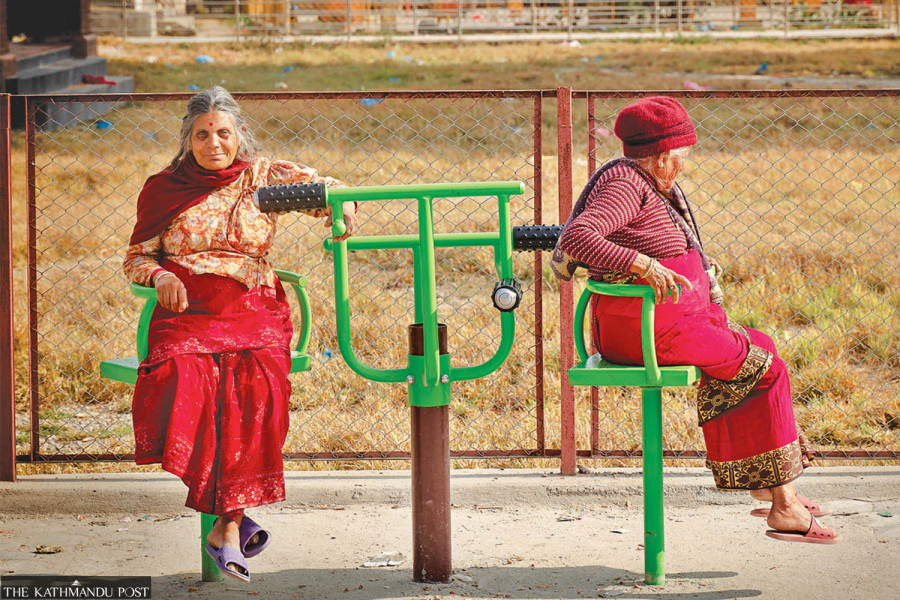Health
Health Ministry asks WHO to help set up open-air fitness centres
Department of Ayurveda and Alternative Medicine says outdoor gyms will help fight non-communicable diseases.
Post Report
The Department of Ayurveda and Alternative Medicine has requested the World Health Organisation (WHO) for help to set up open-air gyms in cities and towns across the country.
Officials said open-air gyms that anyone can use for free will help address the growing burden of non-communicable diseases.
“We have submitted a proposal requesting the UN health agency for help to set up outdoor fitness centres,” said Dr Vasudev Upadhyay, director general of the department. “We hope they will heed our request.”
Setting up outdoor gyms, imparting training to communities and school students, and promoting healthy lifestyles are among the measures the department has been taking in an attempt to reduce the major risk factors for non-communicable diseases.
Doctors warn that non-communicable diseases—hypertension, heart disease, stroke, and diabetes—could lead to a public health crisis, if not immediately addressed. They blame sedentary lifestyle as the main culprit for the rise in non-communicable diseases.
Studies too, show that blood pressure, blood sugar and cholesterol levels are going up among Nepalis owing to sedentary lifestyle and lack of exercise.
A 2019 study on the prevalence of non-communicable diseases by the Nepal Health Research Council found that non-communicable diseases accounted for 71 percent of the deaths in the country.
The study showed that hypertension, diabetes, renal malfunction, liver problems, heart issues, and cervical cancer are responsible for the majority of the morbidity and mortality in Nepal.
The study was primarily focused on behavioural risk factors including tobacco and alcohol consumption, and biological risk factors such as raised blood pressure, overweight, obesity, abnormal lipid prevalence, coronary artery disease, chronic obstructive pulmonary disease and diabetes.
With the rise in non-communicable diseases, people, mainly in urban areas, also seem to have become more conscious about their health.
Lately, many ward offices and community organisations have been running open-air gyms at public parks and squares in Kathmandu and other urban centres, and one can see an enthusiastic participation of people in such places. People, especially the elderly, working out at such gyms is a common sight nowadays.
The department has already set up open-air fitness centres at the headquarters of all seven provinces. The office has also developed a school curriculum on yoga and healthy lifestyle and has been encouraging schools to allocate at least one class per week for the subject.
In the past, the UN health office had provided the department a financial assistance of about Rs1 million to organise yoga and fitness training programmes.
“We have also provided training to teachers and students and taught them about the importance of Ayurvedic medicines and the use of medicinal herbs to encourage a healthy lifestyle,” said Upadhyay. "We hope if we are able to train students on the importance of Yoga and Ayurveda from the school level, it will be a life lesson for them."
Non-communicable diseases are increasingly becoming a major public health issue in Nepal.
Public health experts say the increase in the burden of non-communicable diseases is a global phenomenon, but developing countries like Nepal face a double whammy.
A report of the Nepal STEP survey-2019 on non-communicable disease risk factors jointly carried out by the World Health Organisation, the Ministry of Health and Population and the Nepal Health Research Council also revealed alarming signs on a number of issues—growing consumption of alcohol, tobacco, salt and junk food, and insufficient intake of vegetable and fruits—that lead to cardiovascular diseases.
Experts say the rise in non-communicable diseases not only affects a particular family, it impacts the entire society, which in turn crimps national progress.




 18.12°C Kathmandu
18.12°C Kathmandu














